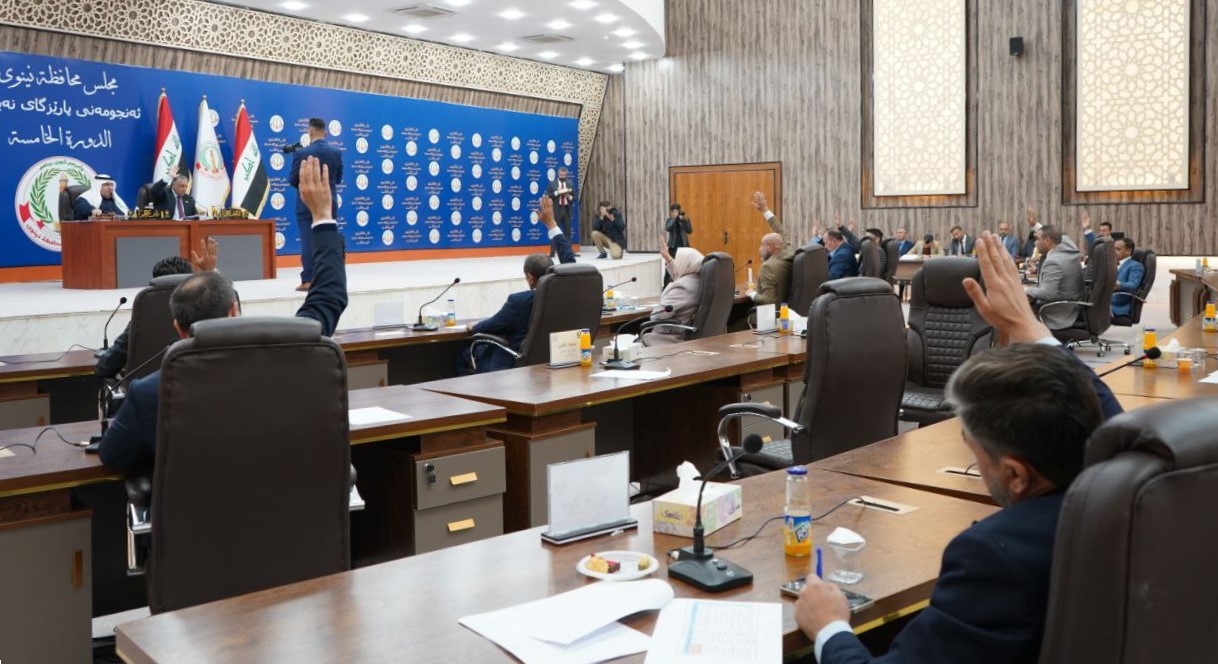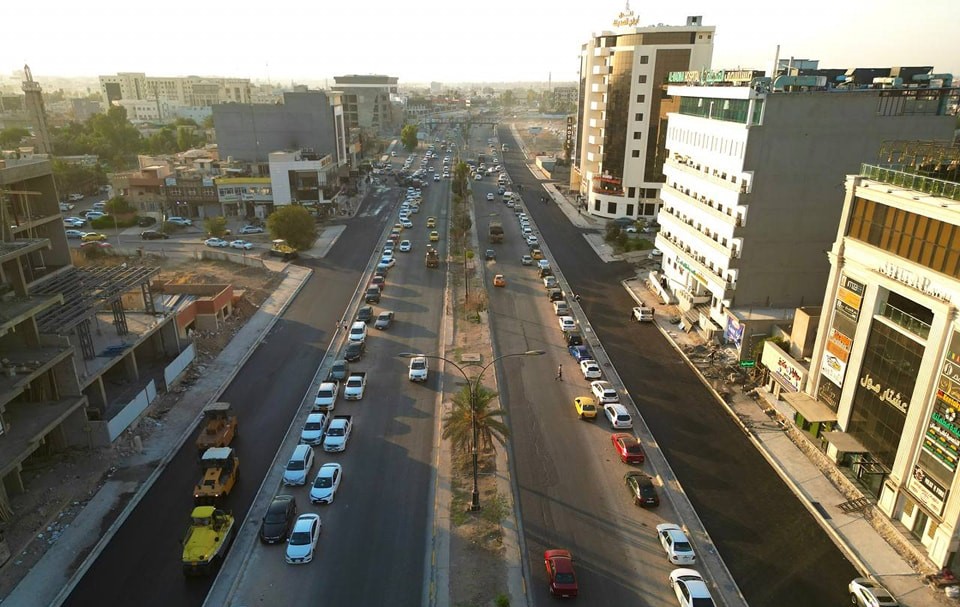Nineveh's budget amounted to about 400 billion Iraqi dinars IQD (USD300M), including the petrodollar, reconstruction and development budget, which council members are waiting to be allocated "fairly".
According to follow-ups by (KirkukNow), multiple budgets have arrived for the Nineveh Provincial Council, including the petrodollar budget, the regional development budget, and the budget allocated within the framework of the reconstruction fund for areas affected by terrorist operations is scheduled to be delivered soon.
On November 24, the Nineveh Provincial Council approved the petrodollar budget, which amounted to 1.1 billion IQD (USD730,000), according to Mohammed Jassim Kakai council member.
A part of the council meeting was devoted to voting on the petrodollar budget and the border crossings budget and approving them, but neither the council members nor the statement issued from the meeting revealed any information about the details of those budgets at the time.
"The amount (of the petrodollar budget) is allocated more to departments that do not have budgets, part of it to purchase the supplies of the province (public) departments and rehabilitate checkpoints and customs," Kakai said.
He explained that 450 million IQD of the petrodollar budget were allocated to aid patients who need treatment outside Iraq.
The method of distributing and spending the budget is the responsibility of the Governor’s office and then the council discusses and approves it.
This budget is allocated to projects throughout the province, according to the percentage of the population in each region.
According to the law of provinces not organized in a region No. 21 of 2008, as amended, the petrodollar budget is included in the financial resources of some provinces, which consists of five dollars for each barrel of crude oil produced in the province, in addition to five dollars for each barrel of crude oil refined in the province’s refineries, and five dollars for every (150) cubic meters of natural gas production in the province.
The volume of oil exports from the "Gayara" field in Nineveh is not fixed and ranges between 0,5-1 million barrels per month. Al-Gayara is one of the largest oil fields in the province, along with the fields of Ain Zala, Najma, Batma and Safiya.
This budget is allocated to projects throughout the province, according to the population percentage in each region
Nineveh Provincial Council member Ahmed Al-Kiki told (KirkukNow), "So far, the budget for regional development and petrodollars has reached the council and has been approved," and the budget for service projects has not yet been discussed.
"Every budget must be distributed according to the population, but this paragraph has not been implemented in its entirety until now. They say that it was prepared according to the population, but there is some kind of confusion," Al-Kiki did not elaborate further, but he said that there will be no more justifications since the results of the general census will show the population in each region.
"We will do everything we can in the council to approve budgets and projects based on the population ratio in order to ensure justice and equality," he added.
The Council's law refers in more than one paragraph to the issue of distributing the budget according to the population ratio, and with regard to the other financial resources of the province, the law clarifies that part of it consists of what the federal budget allocates to the province in a manner sufficient to carry out its burdens and responsibilities and according to the population ratio and the degree of deprivation and in a manner that ensures balanced development for the various regions of the country, in addition to non-oil revenues.
"In the regional development budget, Nineveh's share was reduced to 200 billion dinars," Kakai say and that this budget is allocated to projects throughout the province, according to the population ratio in each region.
In previous meetings of the governorate council, the content of the Nineveh Province Diwan's letter on service projects and corporate social responsibility towards the provinces for the years 2024, 2025 and 2026 was voted on, in addition to resolving several other financial files and sectors.
"The Sinjar and Nineveh Plain Reconstruction Fund is 150 billion dinars for three years (2023, 2024 and 2025), at a rate of 50 billion dinars per year, distributed according to the population ratio, but it is only allocated to the affected areas in Sinjar and the Nineveh Plain, and not a single dinar is allocated to the center of Mosul," according to Jassim.

Thousands of citizens were subjected to campaigns of killing, kidnapping and displacement at the hands of the "Islamic State of Iraq and the Levant - ISIS" organization between mid-2014 and mid-2017.
Nineveh provincial council member, Eidan Sheikh Kalo, told (KirkukNow), 20 billion dinars were allocated from the Sinjar and Nineveh Plain Reconstruction Fund for Sinjar district, 20 billion dinars for the Nineveh Plain and 10 billion for the Zummar area.
The administrative units in these areas propose implementing a number of projects within the framework of public services, and then these proposals are presented to the Province Diwan before they are approved by the provincial council, according to Eidan.
During a visit he made to Baghdad, the governor obtained approval to disburse 100 billion dinars as compensation for those affected.
The law of provinces not organized into a region states that the local authority allocates a fair share to the administrative units that fall under it, sufficient to carry out their burdens and responsibilities, according to the percentage of the population in it.
Kalo pointed out that 34 projects have been proposed for implementation in Shingal (Sinjar) at a cost exceeding 40 billion IQD, and once these projects are approved, the amounts will be allocated to them.
Among the other files for which a special budget is allocated is the file of those affected by the war, and according to previous information obtained by (KirkukNow) from the Nineveh administration, about 90,000 civilians in Nineveh are seeking compensation.
Abdul Qader al-Dakhil, Governor of Nineveh, said in a press conference held a few months ago, attended by a KirkukNow correspondent, that he had obtained approval to pay 100 billion dinars in compensation to those affected during a visit to Baghdad.
The budget discussions in Nineveh come at a time when disagreements continue within the Nineveh Provincial Council, which has been divided into two fronts since last July, which has led to the disruption of its regular sessions for several months.
The council was divided into two factions. The first is the Future Nineveh Alliance, which successfully elected the heads of the administrative units holding 16 out of 29 total seats. This faction comprises the Coordination Framework forces, the Patriotic Union of Kurdistan PUK bloc, Sunni members, and three minority quota members.
The second faction consists of the United Nineveh Alliance and the Kurdistan Democratic Party KDP, holding 13 seats.
*This story has been produced as part of the 'Budget is Your Right' initiative, with support from the National Democratic Institute (NDI).





